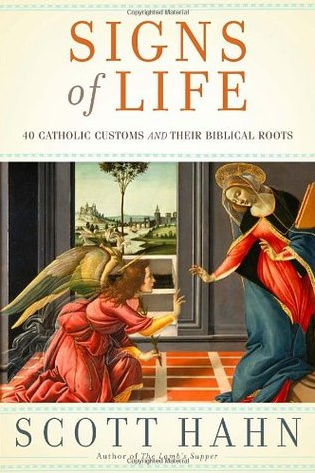

Scott Hahn · 276 pages
Rating: (1K votes)
“If we do not fill our mind with prayer, it will fill itself with anxieties, worries, temptations, resentments, and unwelcome memories.”
― Scott Hahn, quote from Signs of Life: 40 Catholic Customs and Their Biblical Roots
“The first Christians were eucharistic by nature: they gathered for “the breaking of the bread and the prayers.” They were formed by the Word of God, the “apostles’ teaching.” When they met as a Church, their worship culminated in “fellowship”—the Greek word is koinonia, communion. The Mass was the center of life for the disciples of Jesus, and so it has ever been. Even today, the Mass is where we experience the apostolic teaching and communion, the breaking of the bread and the prayers.”
― Scott Hahn, quote from Signs of Life: 40 Catholic Customs and Their Biblical Roots
“St. Thomas Aquinas taught that water has been a natural sacrament since the dawn of creation. In the age of nature—from Adam through the patriarchs—water refreshed and cleansed humankind.”
― Scott Hahn, quote from Signs of Life: 40 Catholic Customs and Their Biblical Roots
“As Catholics, we are free to cultivate a rich life of piety, drawing from the treasures of many lands and many ages.”
― Scott Hahn, quote from Signs of Life: 40 Catholic Customs and Their Biblical Roots
“Sometimes suffering is what’s best for us, if only because it keeps us from sinning or tempting others to sin.”
― Scott Hahn, quote from Signs of Life: 40 Catholic Customs and Their Biblical Roots

“The Catholic life—the great Christian tradition—is a tremendous inheritance from two millennia of saints in many lands and circumstances.”
― Scott Hahn, quote from Signs of Life: 40 Catholic Customs and Their Biblical Roots
“Never underestimate how extraordinarily difficult it is to understand a situation from another person's point of view.”
― Eleanor Catton, quote from The Luminaries
“She gets that words are sometimes bullshit and people don’t mean what they say and through it all it’s only actions that matter.”
― Katy Evans, quote from Remy
“I’m afraid I don’t suffer petty bureaucrats gladly. A very bad habit, but one I find hard to break. Nevertheless, you will find, Dr. Kelly, that humiliation and blackmail, when used judiciously, can be marvelously effective”
― Douglas Preston, quote from The Cabinet of Curiosities
“The young gentleman is correct," he said.
Halt raised an eyebrow. "He may be correct, and he is undoubtedly young. But he's no gentleman."
~Halt and General Sapristi speaking of Will”
― John Flanagan, quote from The Emperor of Nihon-Ja
“Hey, you've still got your endangered hymen. Which means you'll make it to closing credits - I'm s.o.l.”
― Kresley Cole, quote from Poison Princess
BookQuoters is a community of passionate readers who enjoy sharing the most meaningful, memorable and interesting quotes from great books. As the world communicates more and more via texts, memes and sound bytes, short but profound quotes from books have become more relevant and important. For some of us a quote becomes a mantra, a goal or a philosophy by which we live. For all of us, quotes are a great way to remember a book and to carry with us the author’s best ideas.
We thoughtfully gather quotes from our favorite books, both classic and current, and choose the ones that are most thought-provoking. Each quote represents a book that is interesting, well written and has potential to enhance the reader’s life. We also accept submissions from our visitors and will select the quotes we feel are most appealing to the BookQuoters community.
Founded in 2023, BookQuoters has quickly become a large and vibrant community of people who share an affinity for books. Books are seen by some as a throwback to a previous world; conversely, gleaning the main ideas of a book via a quote or a quick summary is typical of the Information Age but is a habit disdained by some diehard readers. We feel that we have the best of both worlds at BookQuoters; we read books cover-to-cover but offer you some of the highlights. We hope you’ll join us.